Thailand in 2020: A Review of the Year
Part One: How reckless royal excess, the disruptive power of social media and a deadly global pandemic plunged Thailand's monarchy into an unprecedented crisis
2020 was the year that mass opposition to the monarchy emerged openly for the first time in Thai history. The propaganda and myths of the palace faced an unprecedented onslaught, and faith in the royals as a cornerstone of Thai identity collapsed.
This is the story of how — and why — it happened.
1. Sirivannavari sails into a storm
The first significant shutdown in Thailand in 2020 wasn’t caused by the coronavirus. It was demanded by King Vajiralongkorn’s daughter Princess Sirivannavari Nariratana Rajakanya because she wanted to go on a New Year holiday to Phuket with some wealthy friends without having to tolerate the annoying presence of commoners.
Sirivannavari and her entourage flew to Phuket on December 30 in a private jet that turned its transponder off in an attempt to evade detection, but it was easy to track her movements because of all the photographs she posted of her pet Yorkshire terrier Princess Perfume, who has her own Instagram and Facebook accounts, at various venues during the holiday.
They stayed at the luxury Sri Panwa resort and spent their days island hopping aboard a Reignwood Senior 78 yacht which cost 470,000 baht per day to rent. Several islands including Koh Bi Da, Koh Pan Yi and Koh He were closed to other visitors while Sirivanavari and her entourage were visiting. Fishing boats and ferries were banned from the sea around Phuket, and tour operators were told to suspend diving and sightseeing boat trips around the Nopparat Thara National Park and Phi Phi islands.
This was standard behaviour by Sirivannavari — on previous trips to Phuket she had also demanded a nautical exclusion zone to keep other boats away. Nobody ever dared to complain before. She was oblivious that this time things would be very different.
During 2019, hundreds of thousands of Thais began using Twitter to debate politics. For years, Facebook had been the main platform for political discussion, but that dramatically changed as Thais took advantage of the relative anonymity possible on Twitter to comment on formerly taboo topics — above all, the monarchy.
When Vajiralongkorn blatantly intervened in the March 2019 general election, first forbidding his sister Princess Ubolratana from standing as a prime ministerial candidate for one of Thaksin Shinawatra’s political parties and then telling Thais to vote for “good people” — a euphemism for the junta party and their allies — the hashtag #โตแล้วเลือกเองได้, or #OldEnoughToDecideMyself, went viral on Twitter. It was one of the first examples of “hashtag activism” targeting the monarchy.
In October 2019, a royal convoy caused chaos during the rush hour one evening, provoking more than a quarter of a million angry tweets using the hashtag #ขบวนเสด็จ — #RoyalMotorcade. Alarmed at the outcry, the regime tried to silence social media criticism by arresting 25-year-old Karn Pongpraphapan who was charged with undermining national security. This was an old tactic — targeting one unlucky person for punishment as a deterrent to others. The same thing had happened to activist Jatupat “Pai Dao Din” Boonpattararaksa who was arrested in 2016 and sentenced to two-and-a-half years in jail just for sharing a BBC Thai article on Facebook.
But by now, the “kill the chicken to warn the monkey” strategy was no longer working. The sheer number of critical comments on social media, and the ability of Twitter users to conceal their identity, made it impossible for the regime to effectively police online discourse. Public condemnation and mockery of the royals was happening so frequently and on such a scale that the taboo against criticising the monarchy was irretrievably broken. Thailand would never be the same again.
The #ขบวนเสด็จ hashtag dominated Thai Twitter again in December 2019 after Vajiralongkorn caused another day of traffic mayhem with a trip to collect a new Azimut 77s luxury private yacht, paid for with more than $7 million of taxpayers money, at Sattahip pier. Two major highways were shut down, several Skytrain stations were closed at evening rush hour, and hundreds of tourists were stranded on Koh Larn because boats were forbidden to travel when he was in the area.
So by the time Sirivannavari set off for her New Year trip to Phuket, she was sailing into a gathering storm. There was outrage on social media as details emerged of the chaos caused by her holiday. Twitter was ablaze with criticism using the hashtag #ปิดเกาะ — #IslandShutdown.
A few days later, on January 11, China reported the first known death from a mysterious new virus spreading in Wuhan. A couple of days after that, the first case outside China was confirmed in Thailand. During January more than 25,000 people from China visited the kingdom. By the end of January, 19 cases had been discovered in Thailand.
Respect for the monarchy was collapsing, due to the behaviour of Vajiralongkorn and his family. Emboldened by social media, Thais were losing their fear of condemning the royals. A pandemic was causing worsening panic around the world. The factors that would shape the kingdom’s destiny in 2020 were already in place.
2. Declaration of war
Just after midday on February 8, Jakrapanth Thomma, a 32-year-old sergeant major in the Royal Thai Army, wrote an angry Facebook post denouncing people who enrich themselves by cheating others: “Do they think they can take money to spend in hell?”
A few hours later, the killing began. Jakrapanth headed to the house of his commander Colonel Anantharot Krasae on the outskirts of Korat. Jakrapanth had been involved in various property deals with Anantharot and the colonel’s mother-in-law, and accused them of cheating him out of money. He shot both of them dead.
At the Surathampithak army base, where he worked, Jakrapanth then killed a soldier and stole two Type 11 assault rifles, a M60 machine gun, and 776 rounds of ammunition. Seizing a Humvee military vehicle, he drove towards the centre of Korat, apparently determined to murder as many people as he could.
Jakrapanth stopped at a Buddhist temple, Wat Pa Sattha Ruam, which was busy with Thais marking Makha Bucha day, killing eight civilians and a police officer. From there he drove to the upscale seven-storey Terminal 21 mall where he abandoned his vehicle and began firing indiscriminately at pedestrians and motorists, killing another 12 people. He livestreamed some of the carnage on Facebook and posted various messages and selfies. “Death is inevitable for everyone,” he wrote.
Inside the mall Jakrapanth killed two more shoppers and took sixteen hostages. Two policemen and a soldier were killed during efforts by security forces to storm the building. Jakrapanth’s mother was brought from her home in Chaiyaphum province to try to persuade him to surrender, but to no avail. He held out overnight in the mall, and was finally shot dead shortly after 9 a.m. on February 9.
He had killed 29 people and wounded 57 during his rampage.
The tragedy was a severe embarrassment for the military. It exposed the uncomfortable truth that far from protecting the country from external threats, as armies are generally supposed to do, Thai soldiers spend much of their time on business deals and side hustles. “This is not how truly professional militaries operate,” Anthony Davis, an analyst who writes for the Jane’s Group, told the New York Times.
Media widely reported that Jakrapanth’s rampage was the worst mass shooting in Thai history, but that is only true if we don’t count the massacres of protesters in Bangkok in 1973, 1976, 1992 and 2010. In each case, security forces fired indiscriminately on mostly unarmed civilians. The difference was that unlike Jakrapanth, they were following orders and the killing was officially approved.
The king and queen were in Bangkok for a rare visit to Thailand as the crisis unfolded. Since 2007, Vajiralongkorn had been based in Germany, returning home only for events and ceremonies he was obliged to attend. For several years he lived at the Kempinski Hotel at Munich Airport, later rebranded to become a Hilton, but since 2016 he had spent most of his time at the luxury Grand Hotel Sonnenbichl in the Alpine resort of Garmish-Partenkirchen. The king was so averse to spending time in Thailand that he frequently returned for less than 24 hours — arriving early in the morning on a Thai Airways flight from Europe, performing the necessary ceremonies, then leaving without even spending a night in Bangkok.
February 8 was one of those occasions. Vajiralongkorn arrived on a flight from Zurich an hour before sunrise, and after presiding over a Makha Bucha Day ceremony he departed the kingdom a couple of hours after midnight. He had spent just 20 hours and 32 minutes in Thailand, and apparently did not see any need to change his plans because of the catastrophe in Korat. At a moment when Thais might have looked to their monarch for moral leadership and reassurance, he failed them once again.
On February 11, with the hashtag #ปฏิรูปกองทัพ — #ReformTheMilitary — trending on Twitter, army chief Apirat Kongsompong held a news conference to try to repair the damage to the military’s image. “Please don’t blame the army or berate soldiers,” he pleaded, theatrically choking back tears. “If you want to blame someone, you blame General Apirat Kongsompong.”
They were just empty words — Apirat had no intention of taking responsibility for the tragedy, and refused to resign.
By 2020, Apirat had become one of Vajiralongkorn’s most trusted and important allies. The son of a notorious general with a scandalous private life who was the figurehead of a 1992 coup, Apirat was an extremist ultraroyalist with a fanatical devotion to the monarchy and military. In 2018 he spent three months undergoing the gruelling training regime for Vajiralongkorn’s elite force, the Royal Guard 904, commanded directly by the king. By 2020 this Praetorian Guard had expanded to more than 7,000 soldiers and controlled all strategic locations in Bangkok, insulating the king against any attempt to overthrow him even if the wider military turned against him.
For decades one of the big debates among academics and analysts studying Thailand has been whether the monarchy or military is the paramount institution in the kingdom. The balance of power has shifted several times, but after Vajiralongkorn became king and put the Royal Guard 904 in charge of securing Bangkok, blurring the lines between the monarchy and military, there was no longer any question about where real power lay in Thailand. Prime Minister Prayut Chan-ocha and his cabinet oversaw the day-to-day administration of the country but they were just a puppet government. Thailand was ruled by a militarised absolutist palace and a royalist elite military force, with Vajiralongkorn firmly in control, supported by Apirat.
Vajiralongkorn and Apirat hated and feared the democracy movement in Thailand, and were determined to crush the the Future Forward Party, founded by progressive billionaire Thanathorn Juangroongruangkit, which had scored a remarkable result in the 2019 general election, gaining more than six million votes and winning 80 seats to become the third largest political bloc in parliament. Thanathorn and other Future Forward leaders had been careful to avoid any overt challenge to the monarchy, but they were open about wanting the military out of politics and an end to Thailand’s dizzying cycle of coups.
Apirat’s tearful performance after the Korat mass shooting was not the first time he had cried openly at a public event. In October 2019 he gave a hysterical speech in which he claimed a sinister alliance of former communists, leftist academics, corrupt politicians and foreign provocateurs was conspiring to destroy Thailand using “hybrid warfare” tactics that included fake news and propaganda. He wept as he proclaimed his devotion to Vajiralongkorn, and burst into tears again while claiming his father Sunthorn was a war hero who was "shot by the communists while he was piloting a helicopter and protecting his nation". In fact there is no record of his father ever being wounded in battle. Apirat warned that Thailand’s stability could be disrupted by activists using similar tactics to the protesters fighting for democracy in Hong Kong.
By October 2019, Vajiralongkorn and Apirat had become so afraid of Future Forward and the risks of a Hong Kong-style uprising in Thailand that they decided to take decisive action. The method they chose had been employed several times already by the palace in the 21st century to neutralise enemies without leaving obvious fingerprints — outsourcing the job to the Constitutional Court. Thailand’s justice system has always favoured those with wealth and royal connections, but the courts became particularly politicised after King Bhumibol gave two speeches in April 2006 calling on judges to resolve the country’s political conflict. This heralded the beginning of an era of political judicialisation in which the Constitutional Court intervened numerous times to try to torpedo the political hopes of Thaksin Shinawatra — annulling general elections in 2006 and 2014, removing Samak Sundaravej as prime minister and then dissolving the People’s Power Party in 2008, sabotaging constitutional amendments in 2013, and dissolving the Thai Raksa Chart Party in 2019. Now, Vajiralongkorn ordered the court to deal with Thanathorn and Future Forward.
In November 2019 the Constitutional Court disqualified Thanathorn as a member of parliament because he had allegedly owned shares in a media company in violation of the 2017 constitution. But this did not go far enough to satisfy Vajiralongkorn and Apirat — they wanted Future Forward to be dealt a killer blow.
A case accusing the party of links to a global conspiracy involving the mythical Illuminati secret organisation was so ridiculous that even Thailand’s pliant judiciary had to throw it out, but an opportunity arose in February 2020 when the court was due to rule on whether a 191.3 million baht loan from Thanathorn to Future Forward was an illegal donation. The whole case was absurd because the payment was clearly a loan, which was allowed, not a donation, but the palace ordered Constitutional Court judges to ensure a guilty verdict with a punishment as harsh as possible. An analysis I wrote ahead of the verdict, correctly predicting the outcome, was my most popular Facebook post of 2020, with more than 65,000 reactions and 43,000 shares.
A day before the verdict, a 20-year-old man living in Chonburi with the Twitter name “นิรนาม” — “anonymous” — was arrested and charged with breaking the Computer Crimes Act because of tweets about the monarchy. He was denied bail. Aware that the impending evisceration of the Future Forward Party would infuriate many Thais, the regime was taking preemptive action to try to deter dissent. Once again, it didn’t work. Another social media storm was unleashed, with #saveนิรนาม becoming the top hashtag on Twitter in Thailand. Over the next three days more than 1.5 million baht was raised via social media to help cover his legal costs.
On February 21, as expected, the Constitutional Court dissolved the Future Forward Party and banned Thanathorn and other party executives from politics for 10 years.
“This is not the end, but the beginning,” deputy party leader Piyabutr Saengkanokkul said after the verdict. “This will spread like wildfire.” He was right. The verdict provoked a remarkable wave of protests at university campuses and schools across Thailand, and Thai communities around the world.
On February 24, large “flash mobs” were held at Thammasat University, Chulalongkorn University, Ramkhamhaeng University, Kasetsart University, Srinakharinwirot University and Prince of Songkhla University. Within days there had been protests at more than two dozen universities. There were rallies at two prestigious Bangkok schools — Triam Udom Suksa School on February 27 and the all-girl Suksanari School on February 28.
Each institution had its own Twitter hashtag to organise rallies, and the three-finger “Hunger Games” salute was ubiquitous at the flash mob events. They were the biggest protests against the Thai regime since Prayut and his allies had seized power in a coup in 2014. There was also an unprecedented new — and explosive — element in many of the protests: students held up signs and wrote slogans challenging the monarchy. The anger at Vajiralongkorn that had been simmering on social media was now overflowing into physical protests on university campuses.
The great irony of the events of 2020 in Thailand is that by trying to crush any prospect of a mass protest movement demanding democracy, Vajiralongkorn and Apirat had managed to achieve the opposite of what they intended. They had unleashed the very thing they were desperately trying to prevent.
3. Why do we need a king?
On March 1, Thailand announced its first death from the coronavirus, a 35-year-old Thai man who worked in a King Power duty free shop. It was becoming clear that the pandemic was a global crisis and extreme measures had to be taken to contain it.
The protesters took the responsible decision to suspend their flash mobs due to concerns they could spread the virus. Universities and schools were closed from March 18 as Thailand went into increasingly strict lockdown.
But while the pandemic had ended the threat from protesters — for now — it also exposed the incompetence and dishonesty of the regime. The health minister in Prayut’s cabinet was somebody wholly unsuitable for the job — construction tycoon Anutin Charnvirakul, whose Bhumjai Thai Party was notorious for vote buying and corruption and had based its campaign for the 2019 elections on the promise to create a legal marijuana industry in Thailand. Anutin made repeated gaffes and blunders during February and March, and had to apologise after saying medical workers who contracted the coronavirus would be whipped.
Tourist arrivals plunged as the pandemic began to strangle international travel, and from March 22 all visitors had to show a medical certificate declaring them free of the virus and take out prohibitively expensive health insurance. For a country where the livelihood of millions of people depends directly on tourism, it was a crushing blow.
The military tried to exploit the pandemic for propaganda purposes, producing a video in which Apirat strode through a Skytrain station and along a street in slow motion wearing protective gear with a disinfectant spray, to the soundtrack of a song called “Heroes Tonight” by an obscure Finnish musician. There was no evidence that spraying disinfectant around did anything useful to prevent the spread of the virus, and it was absurd for Apirat to pretend that he was personally taking part in cleaning the streets. In fact, the military had played a major role in spreading the virus — the biggest cluster of infections in March was caused by an army boxing event at Lumpini stadium that breached the government’s shutdown rules.
But it was the monarchy that suffered the worst reputational damage from COVID-19. As Thailand struggled with the escalating crisis, Vajiralongkorn was five-and-a-half thousand miles away at the Grand Hotel Sonnenbichl. Defenders of the continued existence of royalty in the 21st century say a monarch can play a crucial role at a time of national crisis by uniting and reassuring the kingdom. But Vajiralongkorn was nowhere to be seen. He wasn’t even in Thailand. He had failed to provide any leadership in the aftermath of the Korat mass shooting, and now he was failing again as the pandemic plunged Thailand into crisis.
Bavaria announced an emergency lockdown on March 20, with hotels and restaurants closed, and residents only allowed to leave their homes for essential reasons. But instead of leaving Germany and heading back to Thailand, Vajiralongkorn continued his 13-year holiday in Bavaria. On March 18 he had applied for a special permit from the Bavarian authorities to remain at Sonnenbichl. It was granted, with the justification that the king and his entourage were “a single, homogenous group of people with no changes”.
In fact, however, Vajiralongkorn’s large entourage in Germany posed a significant risk of transmitting the disease. The king and his staff routinely ignored the strict lockdown rules, and several palace servants in Germany had already caught the virus. In an effort to contain the outbreak, 119 staff were sent back to Bangkok on a Thai Airways flight on March 22. After arriving in Thailand on March 23 they were quarantined at various army hospitals in the capital. Nobody informed the German authorities that several members of the entourage who flew back to Thailand via Munich Airport showed symptoms of COVID-19. Vajiralongkorn remained in Bavaria with a much smaller group of staff and servants.
Meanwhile, an unprecedented amount of information was being leaked by senior Thai sources who had become bitterly opposed to Vajiralongkorn. At the end of March I published a detailed article on the king’s lifestyle at the Grand Hotel Sonnenbichl, based on information from several senior insiders who confirmed that the king had a harem of around 20 women at the hotel. They had all been given a royally bestowed surname, Sirivajirapakdi, and they were organised in a military-style unit which Vajiralongkorn called the SAS, in homage to Britain’s Special Air Service elite force. Sources said Vajiralongkorn and the harem occupied the entire fourth floor of the hotel, including a special suite he called “the pleasure room”. Suthida, meanwhile, lived a separate life at the five star Hotel Waldegg in the Swiss town of Engelberg, leaving the king free to frolic with his concubines.
Vajiralongkorn’s life of luxury and hedonism in Bavaria was funded by Thai taxpayers. The new national budget bill, announced in March, included nearly 30 billion baht of spending on the monarchy — an extraordinary 0.93 percent of the total national budget. No other country in the world spends more taxpayer money on its royal family.
Outrage at the king’s behaviour exploded online after exiled historian Somsak Jeamteerasakul, one of the foremost experts and commentators on the Thai monarchy, published a tweet about Vajiralongkorn’s antics in Germany, with the hashtag #กษัตริย์มีไว้ทําไม — #WhyDoWeNeedAKing? Over the next 24 hours the hashtag was used more than 1.2 million times as Thais vented their disgust. It was the most overt online challenge the Thai monarchy had ever faced.
Puttipong Punnakanta, a hardline royalist who had been appointed digital economy minister, warned that anyone criticising the king on social media faced years in jail, in a tweet accompanied with a bizarre photograph of somebody typing in handcuffs. But nobody was listening.
4. Pain and propaganda
By early April, the pandemic was causing profound economic pain. Thailand had been placed under emergency rule, a nighttime curfew had been imposed, and foreigners were banned from entering the kingdom. The government had promised to give 5,000 baht monthly cash relief to workers not covered by the social security system for three consecutive months, in a scheme called “No One Left Behind”, at an estimated cost of 50 billion baht. But Prayut told reporters that because more people than expected had signed up to receive the relief, there was only enough money for a single month’s payment. This was just weeks after the regime had approved a royal budget of 30 billion baht for the wealthiest monarch in the world. After an outcry, Prayut reversed course the next day. “We will hand out 5,000 baht for three months, for sure,” he said. “Please rest assured and I’m sorry for my remarks yesterday which might have caused concerns and misunderstandings.” Another of the prime minister’s dubious plans was to ask Thailand’s 20 wealthiest tycoons for ideas on saving the economy.
Vajiralongkorn and Suthida had been due to return to Thailand for a week, to mark Chakri Day and then the beginning of the Songkran holiday. But the government was forced to cancel Songkran events because of the pandemic, and in the end the king and queen made another visit of less than 24 hours, arriving early in the morning of April 6 and leaving during the night. In another sign of the resistance to Vajiralongkorn even within the palace, the schedule for the trip was leaked to me in advance.
By April 7, Vajiralongkorn and Suthida were back in Europe. The brief visit had required bankrupt national flag carrier Thai Airways to organise two return flights by a Boeing 777 from Bangkok to Zurich purely for the royal entourage. A photographer for German newspaper BILD was arrested and handcuffed by Swiss police at Zurich Airport as he filmed the royal arrival from a public area.
Although the king and queen had spent less than a day in the kingdom, the palace tried to pretend that the royal family was working hard and making generous donations to help those affected. Bags of supplies, printed with large white letters declaring they were charity from the palace, were distributed to Bangkok slum residents by members of the royalist “Volunteer Spirit” organisation. Recipients were told to place a table or chair outside their front door, because the bags — which contained a small amount of rice, instant noodles, and soap — were holy royal artefacts which should not be allowed to touch the ground. Residents were also ordered to pose for photographs with portraits of the king.
In fact, the budget for the modest relief packages came from taxpayer funds, and the royal branding was purely for propaganda. Leaked footage of one incident showed Channel 3 royal correspondent Malinee Wanthong badgering an elderly couple to hold up a picture of the king and express their gratitude to the palace.
Sirivannavari also tried to exploit the pandemic to boost her image. Copying the French luxury goods conglomerate LVMH, which had converted three of its perfume factories to produce hand sanitiser, the princess announced that her eponymous fashion brand would also begin making the product. But unlike LVMH, the Sirivannavari corporation had no perfume factories to convert. Instead, pharmacists at Chulalongkorn Hospital were ordered to produce the hand sanitiser, and the princess just provided the Sirivannavari branding and claimed the credit. The whole project was just a marketing stunt. Sirivannavari marked the launch of the sanitiser by releasing photographs on social media showing her dressed as a doctor with Princess Perfume wearing a nurse’s hat.
All over the world, the behaviour of the royals was generating embarrassing media coverage. German international broadcaster DeutscheWelle summed up the situation: “Thailand's king living in luxury quarantine while his country suffers.”
5. Paranoia in the palace
May 1 was the first wedding anniversary of Vajiralongkorn and his fourth wife Suthida, and to mark the happy occasion the palace released official photographs that showed the couple — wearing matching tracksuits — inspecting relief efforts at an army base. Suthida was photographed sewing a face mask as her husband watched. The photographs were intended to give the impression that the king and queen were in Thailand and working selflessly to support efforts to combat the coronavirus. In fact, they had spent less than 48 hours in the kingdom since the beginning of 2020, and the photographs had been hastily staged during their April 6 visit — as could be seen from the timestamp in the URLs of the images, which the palace forgot to remove.
Vajiralongkorn had been due to come back to Bangkok for the first anniversary of his coronation from May 4 to 6, and stay for Visakha Bucha Day on May 7 and the Royal Ploughing Ceremony on May 11. But with Thailand still in lockdown, the visit was cancelled. The king remained in Bavaria, where he soon had a very nasty surprise.
On the night of May 6, messages denouncing Vajiralongkorn and the military, and a notorious photograph of the king wearing a crop top, were projected onto the facade of the Grand Hotel Sonnenbichl, and the nearby town hall in Garmisch-Partenkirchen. It was an unprecedentedly provocative protest against the Thai monarchy, bringing dissent right to Vajiralongkorn’s doorstep. Inside the hotel, according to palace sources, a shocked and enraged Vajiralongkorn wanted to send his bodyguards to assault the protesters, but was dissuaded by some of his more sensible advisers. Thai security guards drove out of the hotel twice in large black vehicles to intimidate the activists, but did not physically intervene.
The protest had been organised by Junya Yimprasert, one of the most prominent exiled Thai critics of the monarchy, working with German activist group PixelHELPER. It was the start of a campaign of events in Germany that targeted Vajiralongkorn more boldly than anyone had ever dared before. In the weeks that followed they beamed messages and images onto the Thai embassy in Berlin, and held several more protests outside the king’s hotel in Garmisch-Partenkirchen, calling for Vajiralongkorn to be kicked out of Germany. According to several sources in Bangkok, Vajiralongkorn ordered the Thai Ministry of Foreign Affairs to raise concerns with German ambassador Georg Schmidt, demanding better security for the king in Bavaria.
The protests spurred some German politicians into action, and they began asking questions about Vajiralongkorn’s presence in Bavaria during the pandemic, and his failure to pay inheritance tax following Bhumibol’s death. "These privileges for a monarch, which are denied to ordinary people, require an explanation," said Katharina Schulze, leader of the Greens and Alliance 90 group in the Bavarian parliament.
In Thailand, criticism of the monarchy was surging. Kyoto-based exiled academic Pavin Chachavalpongpun set up a Facebook group called Royalist Marketplace that relentlessly ridiculed the monarchy, and it quickly attracted hundreds of thousands of members — including a large number of police and soldiers who infiltrated the group to monitor the content. Social media was being used to challenge and mock the royal family on an unprecedented scale.
Ahead of May 22, the sixth anniversary of the 2014 coup, activists staged a light projection protest in Bangkok with messages referencing the 2010 massacre of Red Shirt protesters beamed onto landmarks including Democracy Monument and the Ministry of Defence.
The regime was alarmed about the possibility of mass demonstrations on May 22, and the light projection protests made them even more nervous. Special units of armed police were stationed at government buildings on the coup anniversary. The Student Union of Thailand organised protests, and activist Parit “Penguin” Chiawarak, was detained by police along with several comrades after gathering at Democracy Monument. It was a significant moment — the first protests against the regime since the country went into lockdown in April.
Meanwhile, Vajiralongkorn’s behaviour was generating more embarrassment for the monarchy. Images from Google Earth, confirmed by leaked photographs, showed that as part of his extensive renovations of the Ampornstan Palace complex, the king had installed a 100 million baht Boeing 737 for decoration. Further investigation revealed that the 737 had been repainted with a fake registration to make it look like the Thai Airways plane HS-TDK, aboard which Vajiralongkorn met Suthida for the first time in 2007 when he piloted a charity flight and she was a flight attendant.
On May 24, the king set off for a cycling trip in Bavaria accompanied by an entourage of around 20 people including at least one of his harem, and one of his pet white poodles. One of Vajiralongkorn’s quirks is that although he has an obsession with uniforms and dictating what clothes and hairstyles soldiers and palace staff should have, he also seems to have a fetish for going out in public barely dressed when in Europe. He had already been photographed several times in Germany and Austria cycling in very skimpy clothing, and somebody managed to film video of his latest bike ride in Bavaria. The footage showed the reality of the king’s life in Germany — far from toiling tirelessly to help Thailand overcome the pandemic, he was pedalling around the Bavarian countryside semi-naked with his concubines.
According to sources in the royal entourage, Vajiralongkorn was incandescent with rage as May came to a close. The regular protests outside his hotel and the rise of Royalist Marketplace on Facebook were stunning challenges to his authority that until recently would have been unthinkable. The kingdom’s culture of deference and devotion to monarchy was crumbling. The king launched several vicious purges of palace staff to try to root out whistleblowers who had been leaking information, and ordered his top aides to take dramatic action to hit back at his critics. He wanted to strike fear into his enemies and stop protests against his rule once and for all.
6. Retaliation
On the evening of June 1, 2020, Thai Airways flight TG933 took off from Paris, heading for Bangkok. It was an unusual flight, because the struggling airline had cancelled almost all international routes two months earlier as a result of the pandemic, and TG933 was not one of the sporadic repatriation airlifts organised for Thais stranded abroad. Officially it was a cargo flight, but the plane used, a Boeing 777 with registration HS-TKY, was not one of the airline’s usual cargo aircraft. It was the favourite Thai Airways plane of Vajiralongkorn and his top aides, usually used by them when they travelled between Europe and Thailand. The flight manifest shows that four passengers were aboard — the king’s security chief Jakrapob Bhuridej and three of his team. They landed at Suvarnabhumi early in the afternoon of June 2. It was extremely rare for Jakrapob to leave Vajiralongkorn’s side, but he had been sent back to Bangkok for an important mission — organising a murder.
Two days later, Wanchalearm Satsaksit, a 37-year-old Thai activist living in exile in Cambodia, left his Phnom Penh apartment to buy meatballs at a roadside stall, while chatting on his mobile phone to his sister Sitanun in Thailand. Suddenly a black SUV pulled up and several armed men jumped out, grabbing Wanchalearm before driving away. Over the phone, his sister heard him repeatedly shouting: “I can’t breathe.” For thirty minutes she stayed on the call, listening to muffled noises, before the line went dead. Wanchalearm has never been seen again.
Since 2016, exiled activists had been going missing in Southeast Asia. Ittipon Sukpaen, known as DJ Sunho, disappeared in Laos in June 2016. In July 2017, 10 armed men dressed in black, wearing balaclavas and speaking Thai, seized dissident Wuthipong Kachathamakul, also known as Ko Tee, at his house in Vientiane. Ko Tee, his wife, and a friend who was also in the house were beaten, shocked with electric stun guns, blindfolded and had their hands tied with plastic cuffs. Ko Tee was taken away, never to return. In April 2018, a dissident officer in the Thai special forces, Chaloemsak Ruenmongkon, vanished in Manila after fleeing Thailand to seek asylum aboard. In December 2018, Surachai Danwattananusorn and his comrades Chatcharn Buppawan and Kraidej Luelert disappeared from the house where they had been living in exile in Vientiane. Later that month, three corpses washed up on the banks of the Thai side of the Mekong River, wrapped in rice sacks and fish nets tied with rope. One of them mysteriously vanished after police and a naval patrol boat arrived at the scene. The two other bodies were sent to the Forensic Science Institute in Bangkok and identified as Chatcharn and Kraidej. Their legs had been broken, they were handcuffed, and they had been disembowelled and stuffed with concrete. And in May 2019, three more dissidents — Chucheep Chiwasut, who was known as Uncle Sanam Luang, and his comrades Siam Theerawut and Kritsana Thapthai, went missing after being arrested while trying to cross from Laos to Vietnam using fake passports.
It was clear that authoritarian regimes in Southeast Asia were cooperating with each other to hunt down activists operating on their soil, and in the case of Thai exiles, to turn a blind eye to extrajudicial murder by Thai forces operating beyond their borders. All of the Thai victims had been accused of insulting the monarchy, and it’s inconceivable that the palace was not involved in their kidnap and murder. In fact, all of the abductions had been overseen by Jakrapob, a sinister figure who had become one of Vajiralongkorn’s most trusted aides, in overall charge of the king’s security. Wanchalearm was the tenth victim of the palace assassination network, and Jakrapob had flown back to Thailand to oversee the operation from Bangkok.
Enraged by the protests and defiance against the monarchy, Vajiralongkorn had demanded blood. He wanted somebody to be killed, believing this would terrify his critics into silence. But by 2020, there were few soft targets left for the palace. The most prominent critics of the monarchy had been granted political asylum in countries with strong rule of law — Somsak in France, Pavin in Japan and Junya in Finland. Arranging a murder in one of these nations would be extremely difficult and politically dangerous. It was far easier to target exiles in Cambodia or Laos, but almost all dissidents had already left. For a couple of years after the 2014 coup, Cambodia had been seen as a safe haven thanks to the personal ties between Khmer dictator Hun Sen and Thaksin Shinawatra. Hundreds of dissidents and activists spent time in Phnom Penh and it was the main escape route for Thais seeking asylum in Europe, the US, Australia or New Zealand. But as relations improved between Hun Sen and the junta, Phnom Penh became infested with Thai agents and spies, and most activists decided it was too dangerous to stay.
Wanchalearm was one of the few prominent Thai activists who had remained in Phnom Penh. He was not a vocal critic of the monarchy, instead focusing mainly on mocking the junta. But he was singled out for two reasons. Firstly, he was an easy target — Cambodia is a lawless country and Hun Sen’s regime could be trusted to acquiesce to his enforced disappearance. Secondly, Wanchalearm had been a key member of a network funded by Thaksin that helped Thai dissidents escape to safety via Cambodia after the coup. Almost everybody who had fled Thailand via Cambodia since 2014 knew Wanchalearm and had been helped by him, so his murder would send a chilling message to Thai dissidents all over the world.
Although no trace of him has been found, it is probable that Wanchalearm was tortured and murdered in Cambodia soon after he was kidnapped, and his body buried in a remote location. Sources with inside knowledge of previous assassinations of exiled activists say this is the standard modus operandi in these palace operations.
The enforced disappearance of Wanchalearm Satsaksit was another disastrous strategic blunder by Vajiralongkorn and his allies. They thought it would put an end to mounting opposition to the monarchy. Instead, it poured fuel on the flames.
There was uproar in Thailand. #saveวันเฉลิม quickly became the top hashtag on Thai Twitter with more than half a million tweets after the kidnapping, and #ยกเลิก112 soon started trending too — a call to scrap the archaic lèse majesté law used by the palace for decades to try to stifle dissent. Posters and street art with Wanchalearm’s face appeared all over Bangkok and beyond. The Student Union of Thailand organised a flash mob protest at the skywalk beside the Bangkok Art and Culture Centre the day after Wanchaleram’s abduction. Police tried to disperse the crowd, citing the need for social distancing during the pandemic, but the protesters refused to be intimidated. Three days later dozens of people led by prominent activist Somyot Prueksakasemsuk gathered outside the Cambodian embassy in Bangkok, demanding answers. Rangsiman Rome, a democracy activist who had joined Thanathorn’s Future Forward movement and become an MP, raised the issue in parliament. Reuters reported that Wanchalearm’s disappearance had “reignited protests against Thailand’s military-royalist elite”. It galvanised and radicalised the democracy movement, and dragged the reputation of the Thai monarchy to its lowest point in history. It was the moment when many younger Thais decided enough was enough. It was time to fight.
Vajiralongkorn was shocked that targeting Wanchalearm had made anger towards the royal family even more widespread and intense. He ordered Prayut Chan-ocha and Prawit Wongsuwan to issue a public warning to critics of the monarchy, which they duly did on June 15. Prayut urged Thais not to listen to exiled activists spreading “hateful” fake news to undermine the kingdom — a reference to dissidents like Somsak, Pavin and Junya. But by now millions of Thais, especially from younger generations, had realised that the social media accounts of exiled academics and activists were far more reliable sources of information than the lies of the regime.
June 24 is a significant date in Thailand — the anniversary of the overthrow of the absolute monarchy by the People’s Party in 1932. The revolution had been supposed to herald the dawn of democracy, but royalists never accepted defeat and have been fighting ever since to restore the primacy of the palace. After becoming king in 2016, Vajiralongkorn made it clear he wanted to turn back the clock to the era of absolute monarchy. He behaved like a Siamese monarch from a past era, openly intervening in politics, ordering the murder or imprisonment of those who displeased him, appointing an official consort despite already having a wife, and establishing a harem. He hated the legacy of the 1932 uprising and was doing his best to erase it from history. A historic plaque in Royal Plaza marking the spot where the People’s Party announced their revolution was removed without explanation in April 2017, replaced by a metal disc inscribed with royalist slogans. In December 2018 the Constitution Defense Monument, commemorating the defeat of a royalist military insurrection in 1933 also vanished in the dead of night from the Laksi instersection in the north of the capital. In January 2020 the statues of two leaders of the revolution were removed from military bases in Lopburi that were named after them, and a couple of months later the bases were renamed Fort Bhumibol and Fort Sirikit.
For the democracy activists of the 21st century, the unfinished revolution of 1932 still resonated deeply 88 years later. The stolen plaque marked the spot where, on the morning of June 24, 1932, renegade military officer Phraya Pahol had climbed onto a tank to read the People’s Party manifesto, written by Pridi Panomyong, to the crowd of soldiers and civilians who had gathered there. The sentiments of the manifesto remain highly relevant in contemporary Thailand. It denounced the greed and corruption of the monarchy, which “treated the people as slaves” and grew rich from taxes. It proclaimed: “Let all people know that our country belongs to the people – not to the king, as has been deceitfully claimed.” It was a historic challenge to the archaic ideology of royalism.
Vajiralongkorn and the regime were paranoid about the risk of some kind of uprising on the anniversary. Leaked documents from the palace showed soldiers were ordered to use deadly force if protesters tried to occupy any government or military buildings. Barriers were erected around the Democracy Monument with the false — and unintentionally ironic — claim that it was “under renovation”. But the protesters had no intention of using violence. Early on the morning of June 24, they gathered at Democracy Monument, some dressed as soldiers in the uniforms of 1932. They symbolically placed a replica of the stolen plaque on the ground, and in a remarkable and beautiful protest that foreshadowed the exuberant creativity of pro-democracy rallies later in the year, they erected a white screen and projected a filmed recreation of Phraya Pahol reading the People’s Party manifesto 88 years before. The haunting images of a past era brought back to life in the semi-darkness of dawn were a direct challenge to the monarchy and a brave declaration that the ideals of the 1932 uprising were not dead.
In the evening, another rally was held at the Pathumwan skywalk, where the manifesto of 1932 was read out once again. Protesters unfurled a large banner showing Prayut as a puppet controlled by the King of Hearts playing card. The message was clear.
The protests of June 24 were the boldest so far in Thailand, directly challenging the absolutist reign of King Vajiralongkorn. The kingdom was in uncharted territory. The monarchy was facing its most serious crisis in Thailand’s modern history…
To be continued…
That’s the end of part one. In a couple of days, my next newsletter will tell part two of the story — the extraordinary uprising that escalated in the second half of 2020.
If you have comments, please share and I will join the discussion.
Stay tuned for the next instalment, and if you enjoyed the post, please subscribe!



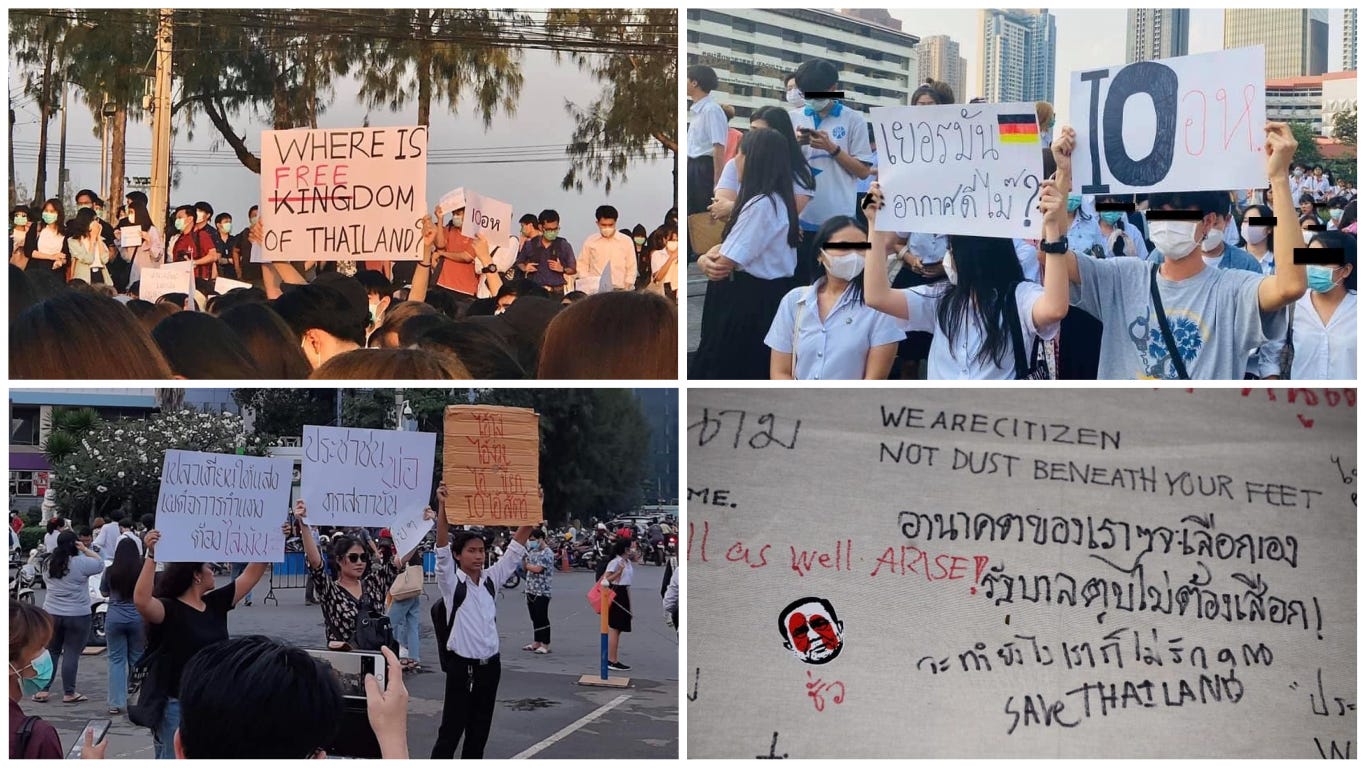



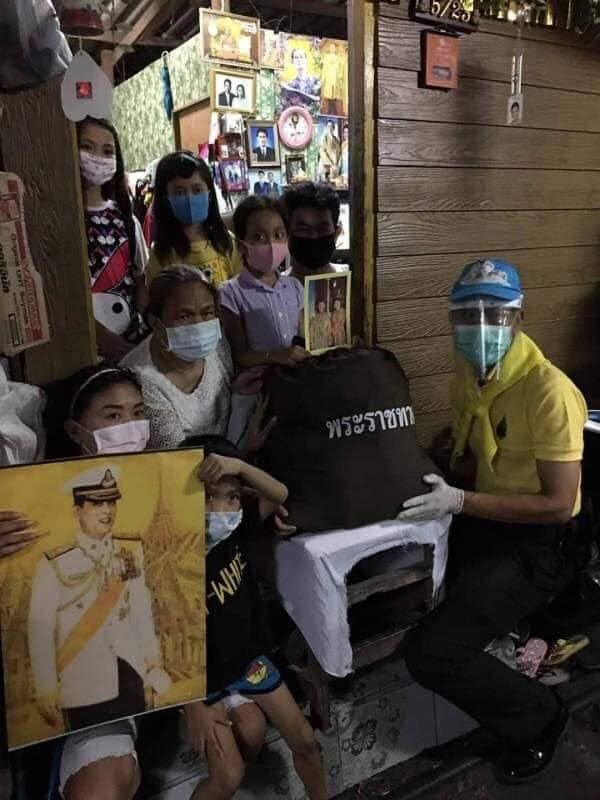

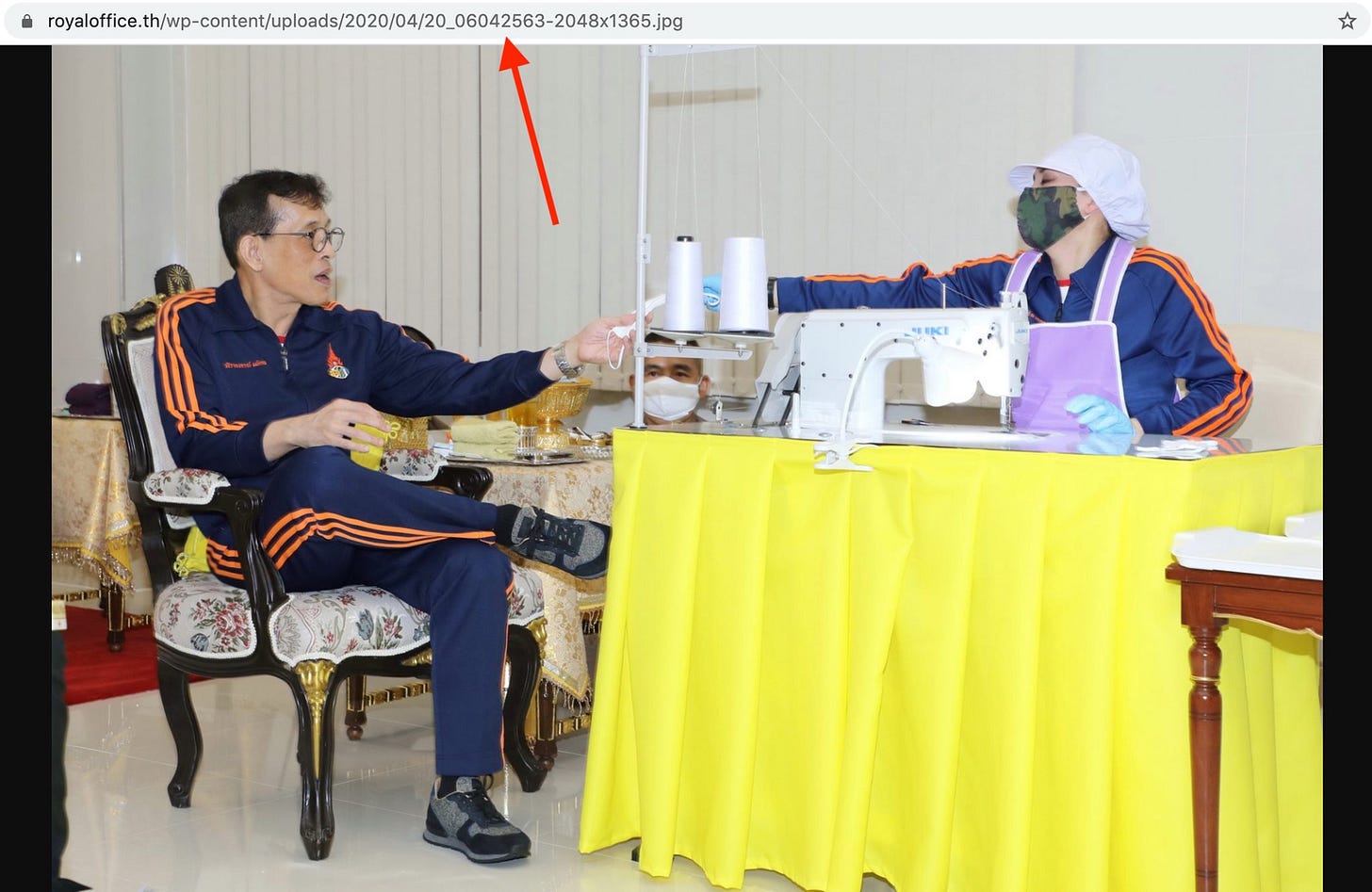
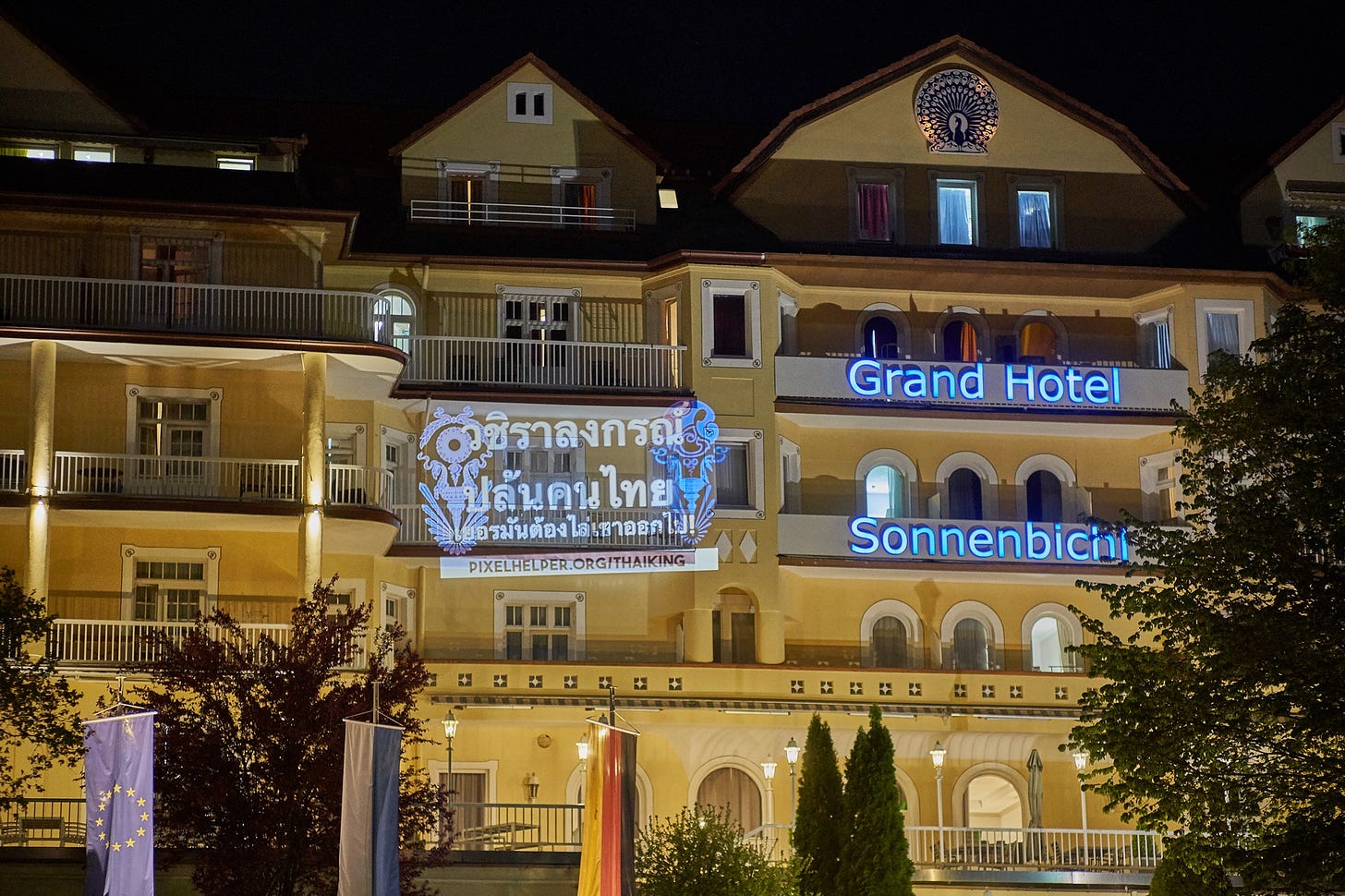
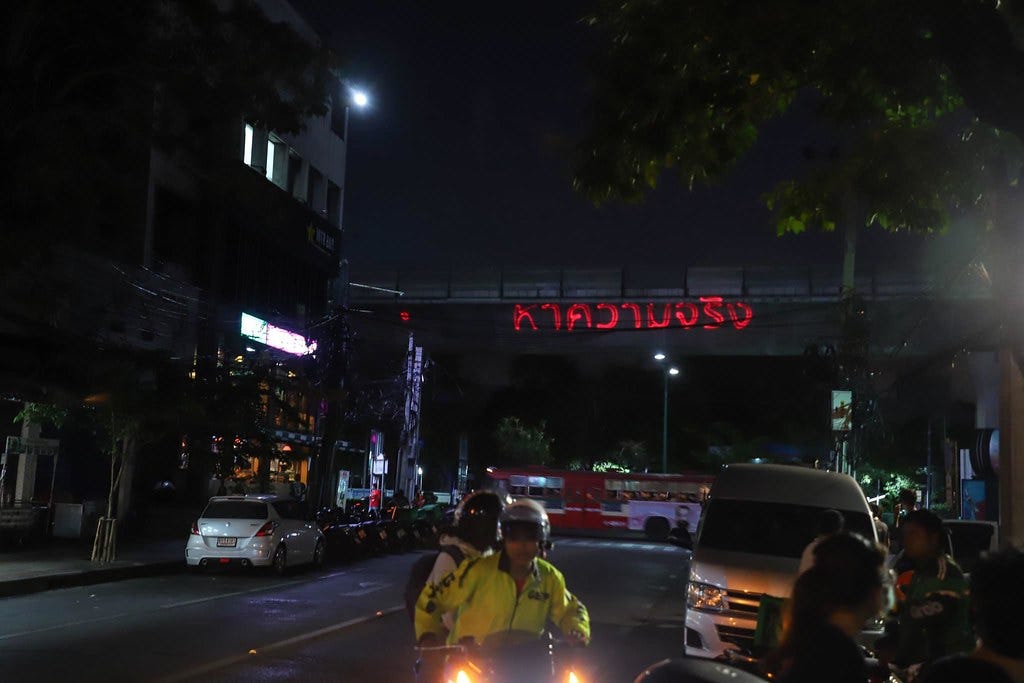
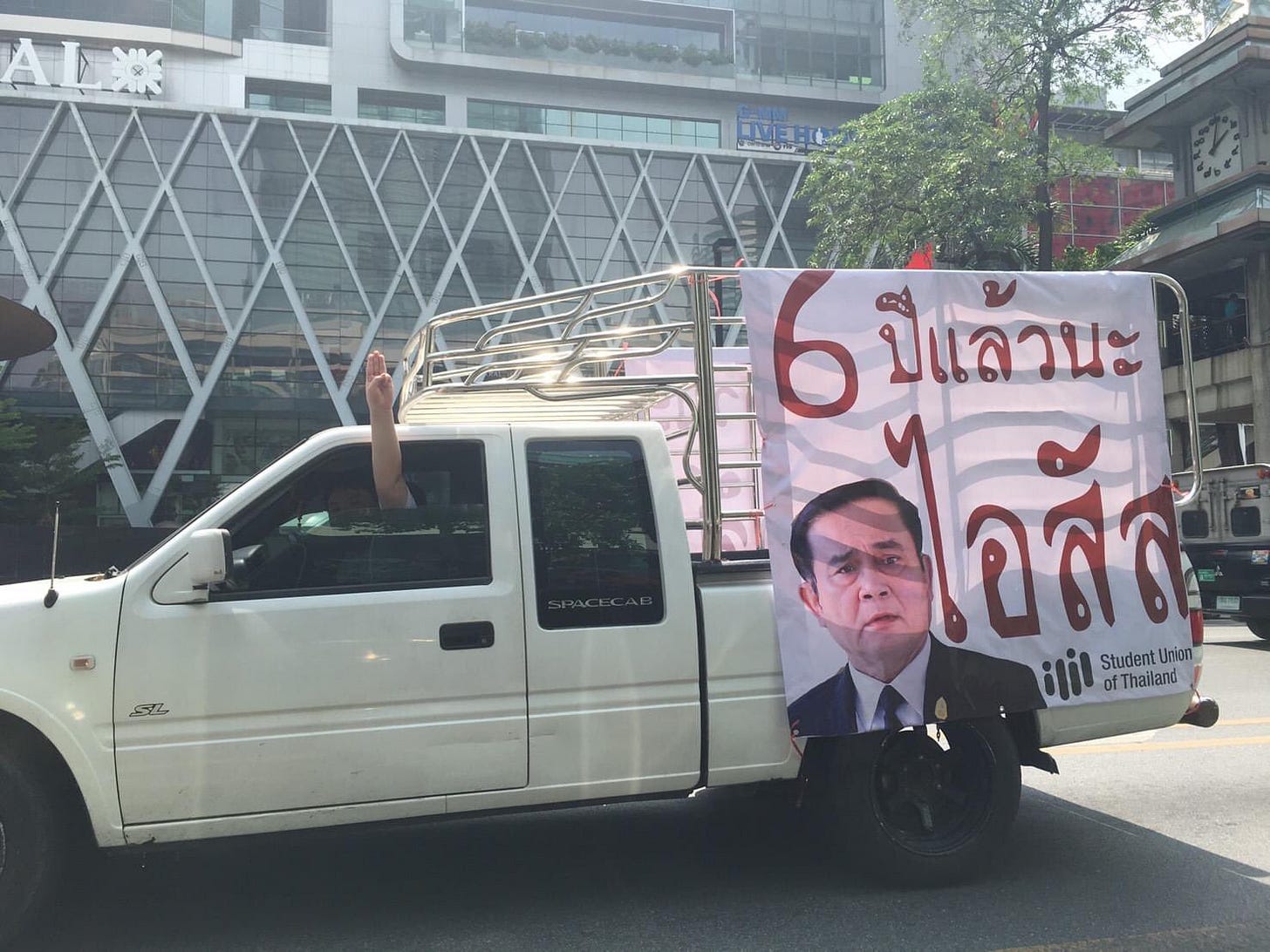


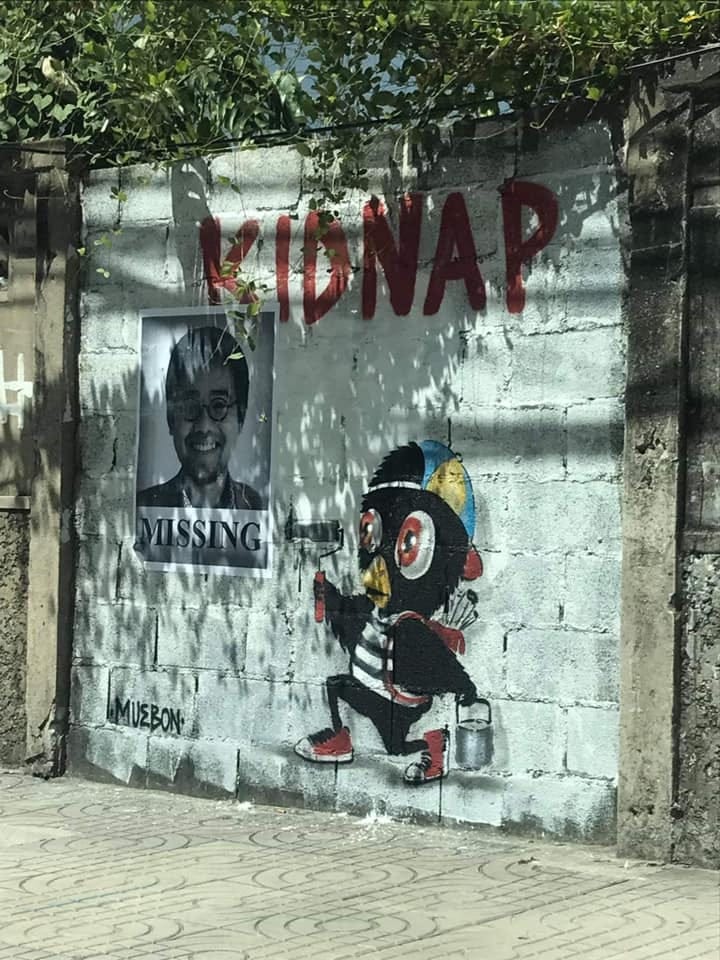
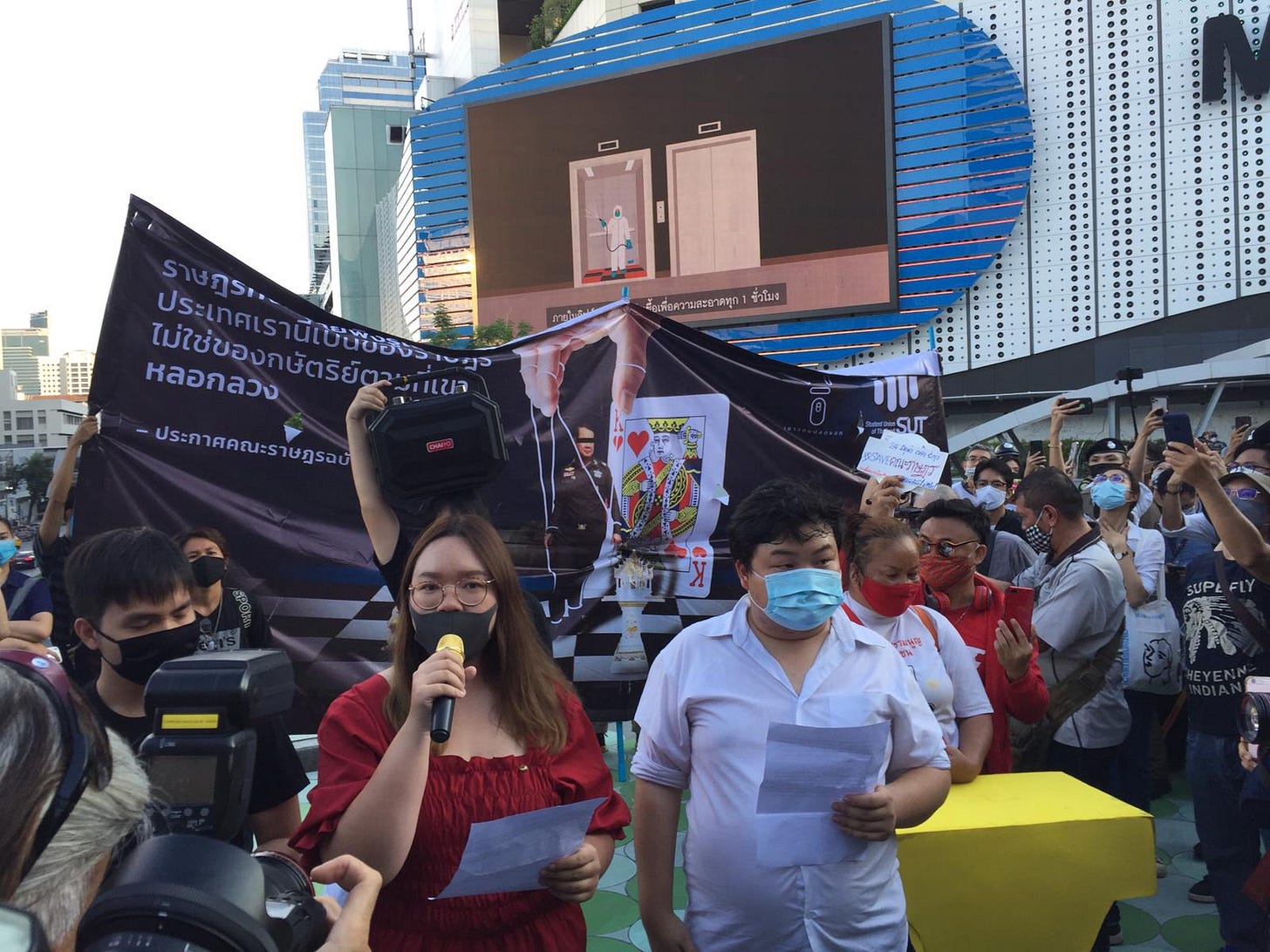
Hi Andrew, Thank you for all the hard work you have been doing over the years. I have subscribed but as yet no further issues on secret siam....When are they starting?
Hi, Andrew. Just wondering if you've given up on the newsletter idea. I haven't seen a post since your first one 10 days ago, and I believe you ended that one by saying there would be two newsletters per week.